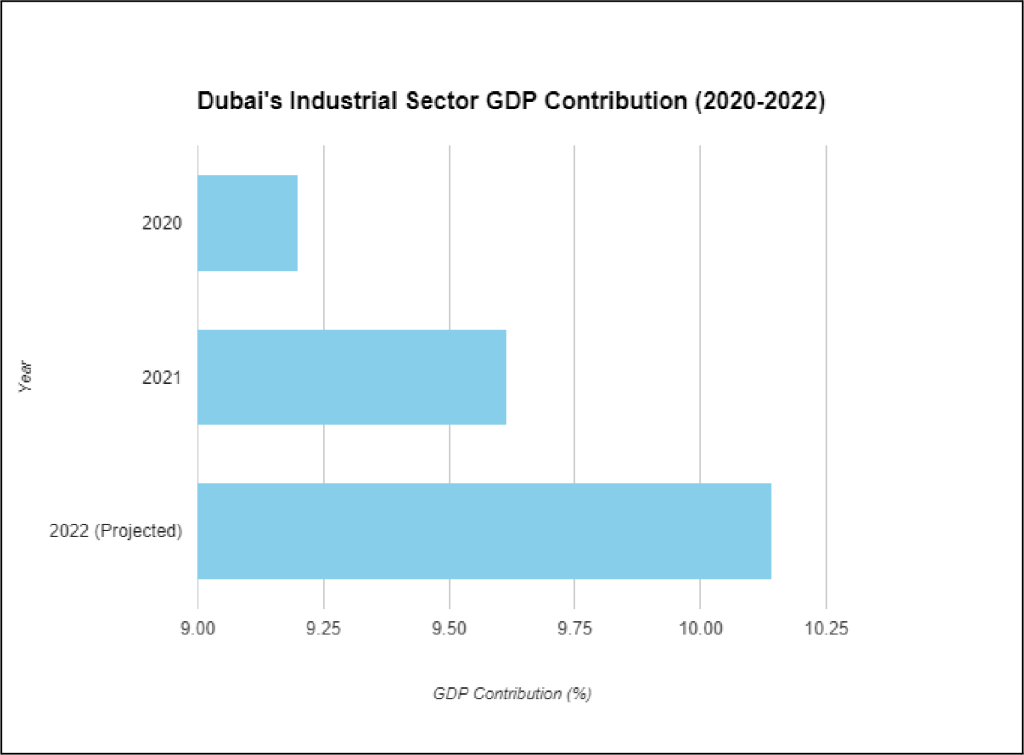The city is a thriving hub for industrial activities, offering numerous advantages for businesses holding industrial licenses in Dubai.
Dubai’s industrial sector saw a significant jump in new industrial licenses in 2020, a whopping 25% increase over 2019. That’s not all—they issued over 1,000 new licenses in total, bringing the overall count to nearly 7,000 by year-end.
This isn’t just a numbers game; Dubai’s factories are a crucial engine for the economy. They contributed a solid 9.2% to Dubai’s GDP in 2020, and experts predict even more growth (4.5% this year) and an impressive 5.5% in 2022!

Other initiatives, like the Dubai Industrial Strategy 2030 and the Dubai Industrial Park, provide a roadmap and practical support for businesses. The Dubai Industrial Academy is even there to help train the next generation of industrial talent.
Additional Considerations
- The significance of having an industrial license in Dubai.
- Why it stands out as the preferred choice for starting industries.
- And how obtaining an industrial license in Dubai is crucial for the success of manufacturing units in the region.
Understanding an Industrial Licence
An industrial license in Dubai permits manufacturing units to alter raw materials or convert natural resources. This transformation aims to produce new, semi-manufactured, or wholly manufactured products
The process involves mechanical or manual methods, including production, segregation, accumulation, and packaging. Notably, a warehouse within the country is a requirement for obtaining an industrial license.
Issuing Authority
The Dubai Department of Economic Development (DED) of the Finance and Industry Ministry is the authority responsible for issuing industrial licenses. This process also requires approvals from other judiciaries and registration under the Chambers of Commerce and Industry.
The validity of an industrial license is subject to compliance with specified conditions.
Application Process
Companies aspiring to acquire an industrial license must operate within the manufacturing, assembly, and processing sectors. The DED oversees the licensing process, meticulously evaluating applications before approving them.
Successful applicants must register their businesses with the Dubai Chamber of Commerce and Industry; approval from the Dubai Municipality is also a requisite.
Here Are the Steps, That You Need to Follow:
Step 1: Eligibility Check
Before diving into the application, companies must ensure they meet the eligibility criteria for an industrial license. This typically includes operating within the manufacturing, assembly, or processing sectors. Ensuring alignment with these guidelines is crucial to a smooth application process.
Step 2: Preparation of Documentation
Once eligibility is confirmed, companies must gather the necessary application documentation. This may include a business plan, proof of business location, ownership documents, and approval from relevant authorities.
Step 3: DED Submission, Evaluation and Approval
The application and required documents are submitted to the Department of Economic Development (DED). This formally initiates the industrial license application process.
The DED evaluates the application, ensuring compliance with regulations and adherence to safety and environmental standards. After evaluation, the DED issues an approval notification to the applicant.
Step 4: Register with the Dubai Chamber of Commerce and Industry
Step 5: Dubai Municipality Approval
Also, approval from the Dubai Municipality is a must. This step involves inspections to ensure safety, health, and compliance with environmental standards. Once approved, the company is closer to acquiring the industrial license.
Step 6: Issuance of an Industrial License
Upon completing the Dubai Municipality’s approval process, the DED issues the industrial license. This document officially authorizes the company to operate within the specified industrial activities.
Step 7: Post-License Obligations
After receiving the industrial license, companies are required to fulfill post-license obligations. This may include periodic renewals, compliance reporting, and adherence to any specific conditions outlined in the permit.
Please Note:
- Conditions and compliance: The duration of an industrial license is contingent upon adherence to the conditions outlined during issuance. Compliance is crucial for conducting industrial activities legitimately.
Industries that convert raw materials or natural resources into new or semi-processed goods may require administrative authorities or Dubai Municipality permissions, making an industrial license indispensable.
- Sector-Specific Approvals: Specific industries may necessitate exclusive permissions and approvals. For instance, a pharmaceutical manufacturing unit requires permits from the Dubai Health Authority (DHA) and the UAE Ministry of Health before commencing operations.
Advantages of an Industrial License
- DED’s Supportive Stance: Picture this the Department of Economic Development (DED) not only reviews your industrial license application but might just throw in some economic perks!
Think operational ease, tax breaks, and customs privileges. It’s like having a supportive ally on your business journey.
- National and International Privileges: Hold on it gets better. If your company is into making products for local consumption or exporting them beyond the UAE borders, having an industrial license brings you extra perks.
It’s like having a golden ticket for your goods to shine on both local and global stages.
- Strategic Locations and Local Sourcing: Imagine your company nestled in an area earmarked for industrial development or using local raw materials for manufacturing. Boom! Extra benefits are coming your way. It’s not just a license; it’s a strategic advantage in the right locations.
- Infrastructure Tailored for Success: Dubai takes pride in offering top-notch infrastructure designed specifically for industries. It’s not just about buildings; it’s about having a workspace that fuels your business growth. It’s like having a bespoke suit tailored for success.
Examples of Industries Requiring Licenses
- Metal Casing
- Manufacturing of Food Products
- Manufacturing of Furniture
- Agricultural Equipment and Accessories
- Adhesive and Paper Slitting
- Aluminium Smelter
- Air-Conditioning Units Assembling
- Aluminium Rolling
- Powder Production
- Foils Manufacturing
- Aluminium Extrusion
- Advertising and Decorative Model Manufacturing
Industries beyond this list may also need an industrial license. To determine your business’s licensing needs or gain more insights into industrial trade licenses in Dubai or the UAE, consult with an expert from Corp Creators today.
Conclusion
In conclusion, acquiring an industrial license in Dubai offers a gateway to many advantages. From economic privileges to market access and strategic infrastructure benefits, Dubai provides a conducive environment for industrial growth.
Understanding the intricacies of the licensing process and seeking professional guidance ensures a smooth and successful journey for businesses in Dubai.
Have more questions? Refer to the FAQs section below or book a free consultation with an expert on industrial licenses right away!
FAQs
1. Is it mandatory to have an industrial license for all manufacturing units in Dubai?
While not mandatory for all, specific manufacturing units must obtain an industrial license to operate legally.
2. What is the role of the Dubai Chamber of Commerce and Industry in the licensing process?
The Chamber is vital for business registration, facilitating access to government bodies, and providing support services.
3. Are there specific areas in Dubai designated for industrial development?
Yes, the government earmarks certain areas for industrial development, providing additional benefits to businesses located there.
4. Can businesses outside Dubai apply for an industrial license in the city?
Yes, businesses from outside Dubai can apply for an industrial license, subject to compliance with regulations.
5. How can I ensure compliance with the conditions of my industrial license?
Regularly staying informed about regulatory changes and seeking professional advice can ensure ongoing compliance.




